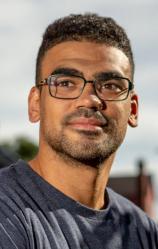Everywhere You Don't Belong
Review
Everywhere You Don't Belong
In Gabriel Bump’s debut novel, Claude McKay Love emerges as an ordinary kid from the South Shore of Chicago. He is ordinary in the horrific way that abandonment by his parents, rioting in the streets in his neighborhood, and deaths of adults explained in simple, childhood terms is ordinary for a young black man’s small world.
EVERYWHERE YOU DON’T BELONG opens with a two-year-old Claude watching his father and another black man wrestling in the front yard. His father is insisting that the stranger apologize for telling him he looks like Booker T. Washington. The man does, but not before the Chicago cops arrive. “You’re brothers --- you’re on the same side,” they scold. Claude’s uncertainty remains about who this individual is and the real reason for the fight. He never sees the man again, and when the police come back asking questions, no one presses charges. No one saw anything. It never happened.
"This coming-of-age story, which ends on a surprisingly solid note, needs Claude to align his past and his future. Even though the violence and brutality of his childhood reappear, so does the familiarity of love."
After his mother leaves one night, and his father follows suit the next day, Claude lives with his grandmother and her friend, Paul. He overhears them listing his problems --- no backbone, adrift, sentimental --- and he goes back upstairs and cries. He cries too often. So Grandma decides to destroy one artifact poisoned with his parents’ spirits each day: a cleanse, she calls it. On Monday, she sweeps their photographs from the piano into a trash can and makes him watch. On Tuesday, she steps on his dad’s favorite Temptations records. On Wednesday, she weed-whacks his mother’s remaining clothes. It is only at the end of the week, when Claude sees that his grandmother will set fire to a cardboard cutout of Dennis Rodman as a last desperate move, that he realizes how deeply she loves him and wants him to stop crying. So he does.
Claude’s middle- and high-school experiences swing back and forth between brutal and hysterical. Although the novel is told by Claude, and he owns his story as narrator, there is an airiness or sense of distance above the action, noticing the events, marking time. He floats above the house on Euclid Avenue and floats in classrooms. He is part of confrontations and explanations about what is happening, but then later, he captures what was meant. He distills the story: “I didn’t know despair had a smell.” Or earlier, when he cannot show his anger: “I imagined a combat sequence that ended in me standing over their bruised and horrible bodies.” Claude understands what is happening, but waits until the commotion has cleared to comment.
Part Two begins after Claude is admitted to the University of Missouri’s prestigious School of Journalism. He becomes one of two black students on the staff of the student newspaper, The Prairie Executioner. After a cringe-worthy icebreaker, he and Simone (a black freshman from Kansas City who had a barn in her backyard) are singled out to create a new diversity project. They begin figuring out what this small Missouri town was doing when big events were happening. As he sorts through pictures of national tragedy after tragedy, Claude flips open a folder of Obama’s election and recalls his own living room that night. Obama, Michelle, Sasha and Malia walk on stage, Grandma turns off the television, mid-Obama-victory speech, the family crying. “That’s my boy!” “There he goes!” Paul switches the TV back to Obama, and they watch the speech. Claude weeps again at the pictures and the memory, and he now realizes his tears are not a reflex; they are power. He notes in his journal that election night still makes him cry.
Claude’s academic life continues by jolts and starts. However immersed he is in the pursuit of becoming a star journalist, and not being simply a token black kid on the newspaper staff, his ties to South Shore remain tight. This coming-of-age story, which ends on a surprisingly solid note, needs Claude to align his past and his future. Even though the violence and brutality of his childhood reappear, so does the familiarity of love.
Reviewed by Jane Krebs on February 21, 2020
Everywhere You Don't Belong
- Publication Date: January 12, 2021
- Genres: Fiction
- Paperback: 288 pages
- Publisher: Algonquin Books
- ISBN-10: 1643750852
- ISBN-13: 9781643750859




